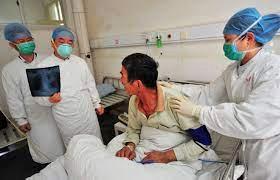
Dr. Richard Webby |
Dr. Richard Webby, Head of the World Health Organization Collaborating Center on Influenza at St. Jude Childrens’ Research Hospital, has expressed concern over the prolonged 2021-2023 panornitic of H5N1 avian influenza that is affecting flocks and migratory birds over five continents. He recently published on the evolution of the virus with specific reference to the susceptibility of an extensive range of terrestrial and marine mammals.
Laboratory infection of ferrets confirmed susceptibility resulting in a high concentration of virus in the brain and nervous system. Outbreaks of avian influenza in mink and especially a 2023 case in Spain where intra-herd transmission was demonstrated, represents a risk to commercial livestock, wildlife species and humans. At the present time, the virus can be regarded as non- infectious to humans. This is based on the limited number of cases recorded among workers having close contact with flocks infected with H5N1 avian influenza during depopulation and disposal.
 According to Dr. Webby “it would take two or three minor changes in one protein of the virus to become more adapted to humans”. Accordingly, reference laboratories worldwide are maintaining surveillance over avian and mammalian H5N1 isolates to detect possible point mutations applying whole genome sequencing.
According to Dr. Webby “it would take two or three minor changes in one protein of the virus to become more adapted to humans”. Accordingly, reference laboratories worldwide are maintaining surveillance over avian and mammalian H5N1 isolates to detect possible point mutations applying whole genome sequencing.
The recognition that H5N1 avian influenza is now seasonally and regionally endemic in many nations and is maintained in free-living mammalian and avian populations questions traditional biosecurity procedures as a means of protecting flocks. This realization is prompting veterinary authorities to evaluate immunization as an adjunct to prevention and control. Dr. Webby is firmly in support of vaccination as practiced in China, Egypt, Viet Nam and Mexico. In coming months, France and Italy will commence vaccination of commercial waterfowl and turkeys, respectively. Dr. Christine Middlemiss, the Chief Veterinary Officer for the U. K., recognizes limitations on the effectiveness of traditional inactivated vaccines but suggests that immunization should be considered.
 Vaccination of poultry flocks is supported by Dr. Monique Eliot, the Director General of the World Organization for Animal Health.(WOAH) Dr. Eliot stated, “Everyone now knows a pandemic is not just a fantasy-it could be a reality.” Accordingly, the World Health Organization and some nations are developing and stockpiling H5N1 vaccines suitable for humans. This involves propagation using SPF eggs but imposes delays before availability. Hopefully, by applying new vaccine technology, mRNA products will become available in the unfortunate event that a vaccine will be required to control a human pandemic. Fortunately, a portfolio of vaccines, including oil emulsion and HVT-vectored products are marketed commercially. Sufficient quantities will be required to commence immunization of breeding flocks and high-risk turkey and layer birds in areas where exposure is likely. Poultry health professionals are aware of risks associated with the presence of migratory waterfowl and the environmental conditions that predispose to infection despite appropriate biosecurity measures.
Vaccination of poultry flocks is supported by Dr. Monique Eliot, the Director General of the World Organization for Animal Health.(WOAH) Dr. Eliot stated, “Everyone now knows a pandemic is not just a fantasy-it could be a reality.” Accordingly, the World Health Organization and some nations are developing and stockpiling H5N1 vaccines suitable for humans. This involves propagation using SPF eggs but imposes delays before availability. Hopefully, by applying new vaccine technology, mRNA products will become available in the unfortunate event that a vaccine will be required to control a human pandemic. Fortunately, a portfolio of vaccines, including oil emulsion and HVT-vectored products are marketed commercially. Sufficient quantities will be required to commence immunization of breeding flocks and high-risk turkey and layer birds in areas where exposure is likely. Poultry health professionals are aware of risks associated with the presence of migratory waterfowl and the environmental conditions that predispose to infection despite appropriate biosecurity measures.